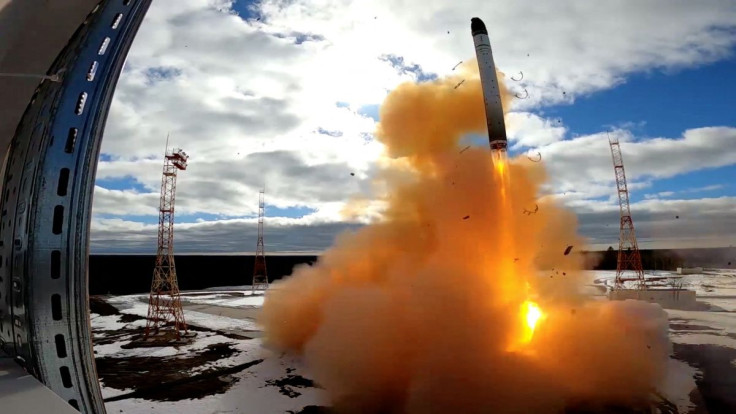Putin Ally Posts Picture Of 'Satan-II' Missile, Says It Is 'Ready For Mass Production'
KEY POINTS
- The image showed the missile being transported by railroad car at an undisclosed location
- Russia said its first Sarmat strategic missile system will be on combat duty by the end of the year
- Putin had earlier said Sarmat would make countries that "threaten" Russia "think twice"
Russia is all set for the serial production of RS-28 Sarmat, an intercontinental ballistic missile, Roscosmos head Dmitrii Rogozin has announced. Rogozin, a close ally of Russian President Vladimir Putin, also posted a photo of the missile.
Rogozin published the image of the Russian-developed ICBM, which is capable of carrying 10 or more nuclear warheads and decoys, on his Telegram page Tuesday.
"The world's most powerful global-range nuclear missile is preparing for new tests and mass production," he captioned the image, showing the missile in the background being transported by railroad car at an undisclosed location.
SARMAT
— T Boy!!!🇳🇬🇷🇺🇳🇬🇷🇺 (@TobiAyodele) July 12, 2022
The world's most powerful global-range nuclear missile is preparing for new tests and mass production pic.twitter.com/5EkCOp4dk6
RS-28 Sarmat, also called Satan -II, is a nuclear-capable, Multiple Independent Reentry Vehicle (MIRV)-equipped rocket that Kremlin believes will provide it parity with the U.S. and its allies. Sarmat is poised to replaced the Soviet-designed RS-36M2 Voevoda ICBMs (NATO reporting name "SS-18 Satan").
Last month, Putin had said that Russia's first Sarmat strategic missile system will be on combat duty at the end of 2022.
"It is planned that by the end of the year, the first such complex will be on combat duty," Putin added. The Russian president had earlier praised the Sarmat missile as a "truly unique weapon" that will make those who try to "threaten" the country in the heat of aggressive rhetoric "think twice."
The first test launch of the rocket was carried out at the end of April from the Plesetsk Cosmodrome in Russia. With a range to strike anywhere on Earth, Sarmat features unique characteristics that will help it breach any existing and future anti-ballistic missile defenses. Russian officials had recently indicated that they expect the Sarmat to serve as a key component in Kremlin's deterrent force for at least half a century.
Sarmat's short initial burn time meant that heat-detecting satellites will have a smaller chance of spotting it, reports said.
Recently, Aleksey Zhuravlyov,the chairman of the far-right Rodina political party, had threatened Western countries helping Ukraine, saying "one Sarmat missile and the British Isles will be no more." Zhuravlyov, a State Duma deputy, was heard discussing live on "Russia 1" channel about how many seconds the missile would take to reach the capitals of Great Britain, Germany and France – each of whom are supplying weapons to Ukraine.

© Copyright IBTimes 2025. All rights reserved.




















